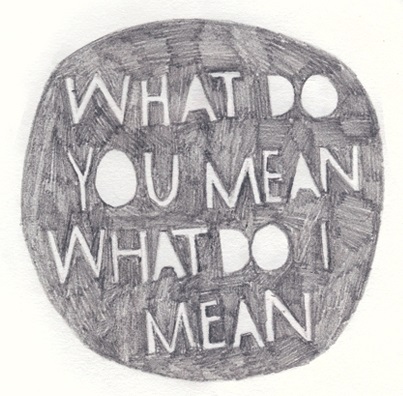FWP:
SETS == DIALOGUE;
EXCLAMATION; KYA
SPEAKING: {14,4}
The power and disdain are all on the beloved's side, but the lover isn't entirely helpless either. Rather than seeking to find an answer for such an insulting (rhetorical) question, he actually counterattacks. The counterattack doesn't, of course, seek to retaliate in kind by actually abusing or insulting the beloved. In fact, there are several things that it could be doing, based on several ways of reading the kyaa :
=In a mild, reasonable, perplexed way, he inquires about this puzzling behavior of hers that he doesn't understand.
=In a sorrowful, reproachful tone he gently appeals to her better nature-- 'Is this any way to talk to a true and devoted lover? Is this style of speech one that does you credit?'
=With exasperation and even a flash of anger, he flings her own kind of rudeness right back at her-- 'What do you mean by this! for shame! how could such ill-bred and unworthy speech cross your lips!'
Whatever tone we choose for the lover's speech, his witty riposte-- using as it does exactly her own kind of rhetorical question-- gives the verse its relish.
Note for fans of Ghalibiana: I couldn't help translating the whole of the famous letter to Mihr in which this verse is quoted. It shows so much about Ghalib's temperament, and his preoccupations in the period shortly after 1857.

Ghalib:
[April 1859, to Mihr:] [A Persian verse:]
'It's a condition of Islam to practice faith in the unseen,
Oh you who are hidden from the gaze, your kindness [mihr] is my faith.'
The auspicious description [of your appearance] brightened my sight. Whatever Mirza Yusuf Ali Khan 'Aziz' said to you, do you know what its origin was? Sometime in a gathering of friends I must have said, 'I want to see Mirza Hatim Ali; I hear that he's a stylish [:tara;h-daar] man'. And my friend, I had heard of your stylishness from Mughal Jan. At the time when she was in the service of Navab Hamid Ali Khan, and she and I had an informal friendship, I used to spend hours in Mughal's company. She has also shown me your verses in her praise.
In any case, when I learned of your tall stature I didn't feel envious. The reason was that my stature too is conspicuous for tallness. I wasn't envious of your wheat-colored complexion. Because when I was alive, my complexion was fair [champa))ii , a lighter color], and people of insight always praised it. Now, if ever I recall that complexion of mine, something like a snake crawls on my breast. Indeed, if I felt envy, and I 'drank the blood of the liver', then it was because your beard is finely clean-shaven. I recalled such pleasure-- what can I say about what passed through me? In the [Persian] words of Shaikh Ali 'Hazin',
'As much as was in my hands, I tore my collar,
I didn't respect the honor of my patchwork robe.'
When in my beard and moustache white hairs appeared, then on the third day 'ant's eggs' began to be visible on my cheeks. In addition to this, it happened that two of my front teeth broke off. Having no choice, I gave up missii [a gum-darkening cosmetic; see {417x,2}], and my beard as well. But please remember that in this uncouth city there is a common uniform. Mullahs, blind Qur'an-reciters, peddlers, huqqah-mouthpiece makers, washermen, water bearers, innkeepers, weavers, greengrocers-- beards on their faces, hair on their heads. The day that this Faqir grew a beard, that same day he had his head shaved. [Arabic] 'I take refuge in God'-- what nonsense I'm talking!
Sahib! This servant sent 'Dastanbu' to the honorable George Frederick Edmonstone Sahib Bahadur, Lieutenant Governor of the North West Provinces, as an offering. And his reply, in Persian, came by post on the tenth of March, with praise and admiration and expressions of pleasure. Then I sent him a Persian ode in congratulations for his Lieutenant-Governorship. Upon receiving it, he sent a Persian letter praising the poem and expressing his appreciation, by way of the post, on the fourteenth. Then I sent a Persian ode of praise and congratulation in the service of Janab Robert Montgomery Sahib, Lieutenant Governor Bahadur of the Punjab, through the good offices of the Sahib Commissioner of Delhi. Yesterday a letter with his seal arrived through the good offices of the Sahib [Commissioner] Bahadur of Delhi. With regard to the pension there is as yet no order. Grounds for hope keep accumulating. [Persian:] 'What comes late, comes right.' I don't eat bread anyway. I have half a ser [1 ser =2 lbs.] of meat in the day, and a paa))o;N bhar [about a ser] of wine at night:
{178,1}
If we are a true Faqir, and the seeker of this ghazal has a perfected taste, then this ghazal will have arrived before this letter. There remains the salaam , and that we ourself will send. (Arshi, p. 321)
==Urdu text: *Khaliq Anjum vol. 2, pp. 719-20*
==another trans.: Daud Rahbar, pp. 97-100